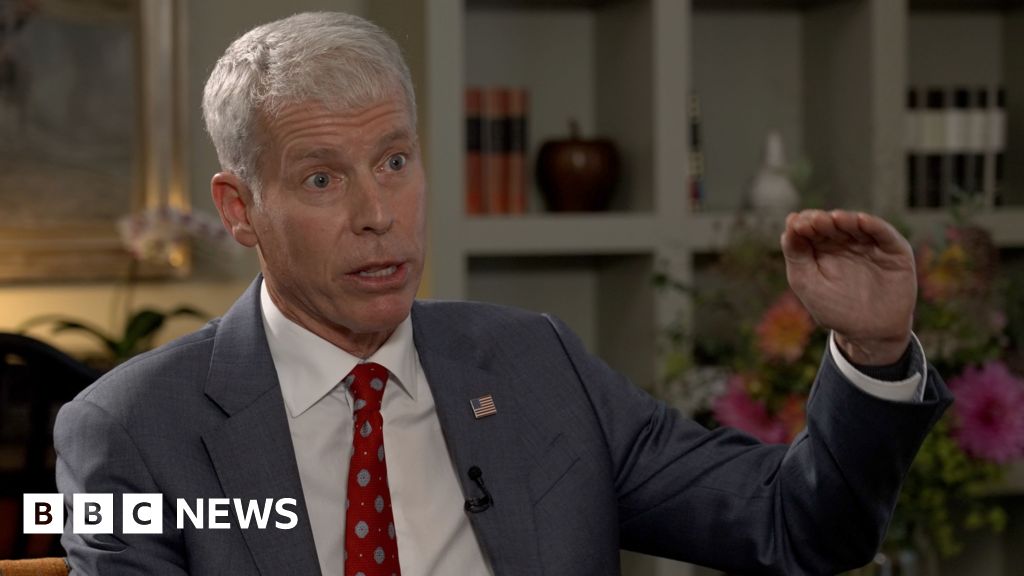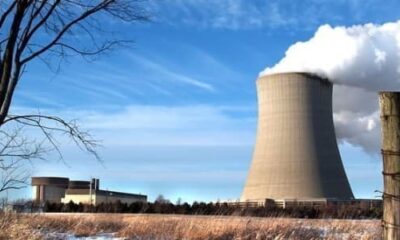Science
US Energy Chief Predicts Nuclear Fusion Will Revolutionize Power

The United States Energy Secretary, Chris Wright, expressed optimism about the future of nuclear fusion, predicting that advancements in artificial intelligence will enable the harnessing of this energy source within the next five years. In an interview with the BBC, Wright asserted that nuclear fusion, which powers the sun, could begin supplying electricity to global grids in as little as eight to fifteen years, potentially leading to significant reductions in greenhouse gas emissions.
Wright emphasized the transformative potential of nuclear fusion, stating, “With artificial intelligence and what’s going on at the national labs and private companies in the United States, we will have that approach about how to harness fusion energy multiple ways within the next five years.” He highlighted that this technology could drastically change energy production, though many scientists remain skeptical about the feasibility of commercial fusion power in the near future.
Nuclear fusion involves fusing atomic nuclei to release energy, a process that requires temperatures far exceeding those of the sun. Despite the complexities, Wright believes that the advancements currently underway could mitigate concerns about climate change by providing a clean energy alternative.
In a broader context, Wright also urged the UK government to reconsider its stance on fossil fuels, specifically calling for an end to the de facto ban on fracking. He argued that developing domestic oil and gas resources, particularly in the North Sea, could revitalize the UK economy. “Fracking could have a tremendous impact on the UK economy,” he stated, suggesting it could create jobs and lower energy costs.
As discussions on energy evolve, Wright noted the Trump Administration’s concerns regarding Europe’s dependency on Chinese renewable technologies. He warned that such reliance could jeopardize the security of energy systems across Europe. Wright’s remarks come as Donald Trump prepares for a state visit to the UK, where he will meet Prime Minister Sir Keir Starmer and attend a banquet hosted by King Charles.
Wright defended the Trump Administration’s cuts to renewable energy subsidies, arguing that after decades of support, it is time for these industries to sustain themselves. He stated, “You’ve got to be able to walk on your own after 25 to 30 years of subsidies.” This stance has drawn criticism, particularly from climate scientists who argue that sustained investment in renewable energy is crucial for combating climate change.
In July 2023, the Department of Energy released a report asserting that the threats posed by climate change might be overstated. This report has faced backlash from over 85 international scientists, who accused it of containing errors and misrepresentations. When discussing this criticism, Wright claimed that the selective use of data is prevalent in climate science and media. “Cherry-picking data in climate science, in the media, by activists and by politicians is the norm,” he said.
Despite acknowledging that climate change is a “very real, physical phenomenon,” Wright suggested that significant decarbonisation efforts may take generations, rather than the two to three decades often projected by advocates. He welcomed the ongoing debate about climate change, indicating that public discourse is essential for progress.
Wright also downplayed concerns regarding proposed cuts to funding for the National Oceanic and Atmospheric Administration (NOAA) and the potential impact on climate research. He asserted that the US government aims to restore what he described as “real science,” arguing that the field of climate science has become overly politicized.
The conversation surrounding energy and climate policy continues to evolve, with significant implications for both national and international strategies. As the push for nuclear fusion technologies progresses, the coming years will be critical in shaping the future of energy production and its environmental impacts.
-

 Entertainment2 months ago
Entertainment2 months agoAnn Ming Reflects on ITV’s ‘I Fought the Law’ Drama
-

 Entertainment3 months ago
Entertainment3 months agoKate Garraway Sells £2 Million Home Amid Financial Struggles
-

 Health2 months ago
Health2 months agoKatie Price Faces New Health Concerns After Cancer Symptoms Resurface
-

 Entertainment2 months ago
Entertainment2 months agoCoronation Street’s Carl Webster Faces Trouble with New Affairs
-

 Entertainment2 months ago
Entertainment2 months agoWhere is Tinder Swindler Simon Leviev? Latest Updates Revealed
-

 Entertainment3 months ago
Entertainment3 months agoKim Cattrall Posts Cryptic Message After HBO’s Sequel Cancellation
-

 Entertainment2 months ago
Entertainment2 months agoOlivia Attwood Opens Up About Fallout with Former Best Friend
-

 Entertainment2 months ago
Entertainment2 months agoMasterChef Faces Turmoil as Tom Kerridge Withdraws from Hosting Role
-

 Entertainment3 months ago
Entertainment3 months agoMarkiplier Addresses AI Controversy During Livestream Response
-

 Entertainment4 months ago
Entertainment4 months agoSpeculation Surrounds Home and Away as Cast Departures Mount
-

 World2 months ago
World2 months agoCole Palmer’s Mysterious Message to Kobbie Mainoo Sparks Speculation
-

 Entertainment2 months ago
Entertainment2 months agoITV’s I Fought the Law: Unraveling the True Story Behind the Drama





















